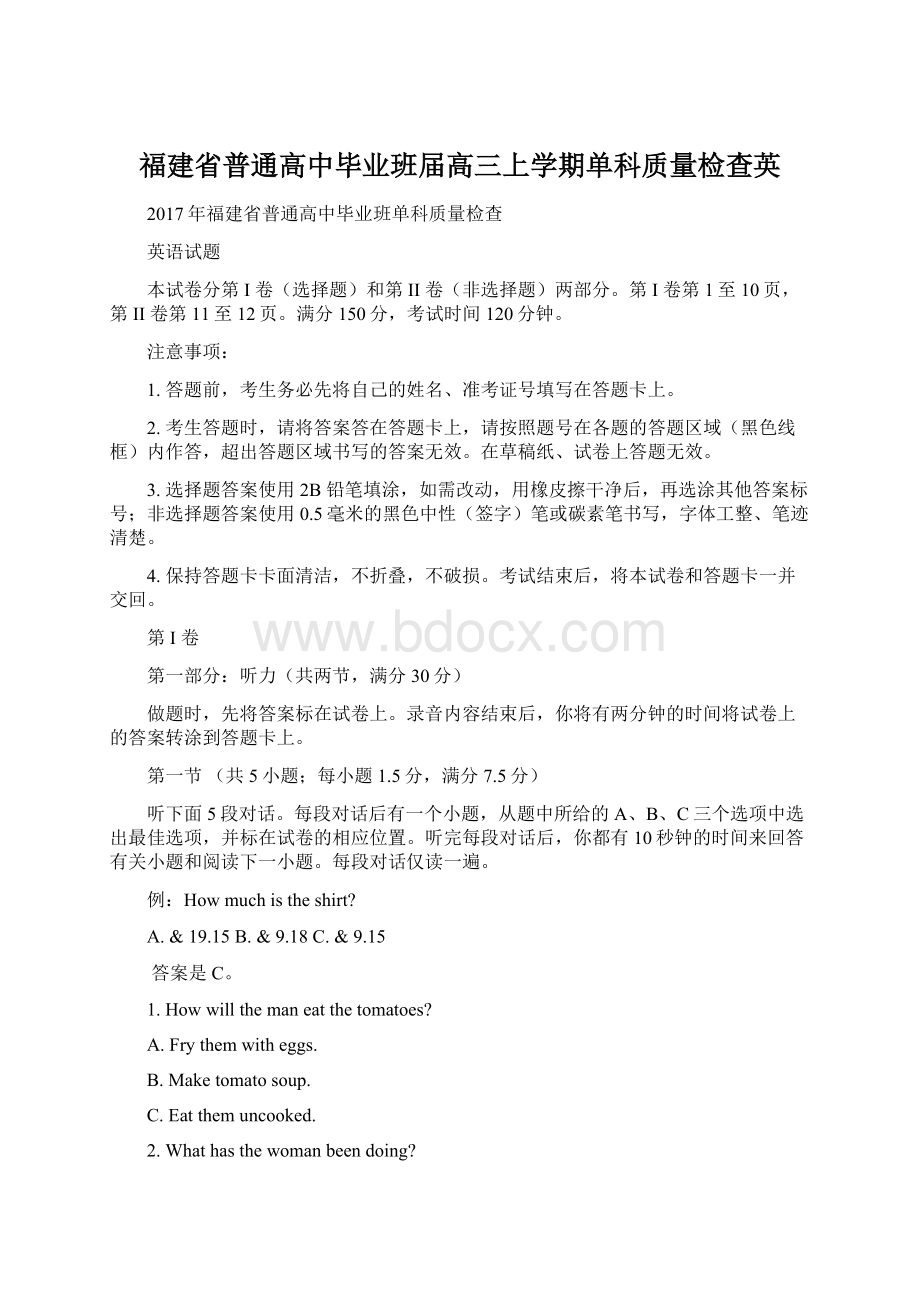福建省普通高中毕业班届高三上学期单科质量检查英Word格式.docx
《福建省普通高中毕业班届高三上学期单科质量检查英Word格式.docx》由会员分享,可在线阅读,更多相关《福建省普通高中毕业班届高三上学期单科质量检查英Word格式.docx(12页珍藏版)》请在冰豆网上搜索。

每小题1.5分,满分7.5分)
听下面5段对话。
每段对话后有一个小题,从题中所给的A、B、C三个选项中选出最佳选项,并标在试卷的相应位置。
听完每段对话后,你都有10秒钟的时间来回答有关小题和阅读下一小题。
每段对话仅读一遍。
例:
Howmuchistheshirt?
A.&
19.15B.&
9.18C.&
9.15
答案是C。
1.Howwillthemaneatthetomatoes?
A.Frythemwitheggs.
B.Maketomatosoup.
C.Eatthemuncooked.
2.Whathasthewomanbeendoing?
A.Writingatermpaper.
B.ReadingHamlet.
C.Performingtheplay.
3.WhenwillDr.Scottarrive?
A.Thismorning.
B.Atnoon.
C.Thisevening.
4.Wheredoestheconversationprobablytakeplace?
A.Inamarket.
B.Inabank.
C.Inabookstore.
5.Whatarethespeakersdoing?
A.Makingabargain.
B.Changingmoney.
C.Talkingaboutthejacket.
第二节
(共15小题;
每小题1.5分,满分22.5分)
听下面5段对话或独白。
每段对话或独白后有几个小题,从题中做给的A、B、C三个选项中选出最佳选项,并标在试卷的相应位置。
听每段对话或独白前,你将有时间阅读各个小题,每小题5秒钟;
听完后,各小题将给出5秒钟的作答时间。
每段对话或独白读两遍。
听第6段材料,回答第6、7题。
6.Wherearethespeakersgoing?
A.Tothebeach.
B.Tothescenicspots.
C.Totheparks.
7.Howwilltheyspendtheirweekend?
A.Workinginarecyclingcompany.
B.Visitingtheoceanpark.
C.Collectingplasticgarbage.
听第7段材料,回答第8、9题。
8.Whodoesthemanhaveanappointmentwith?
’
A.Mr.Green.
B.Catherine.
C.Mr.Petrov.
9.Whenwillthewomanmeettheman?
A.At3:
00thisafternoon.
B.At9:
30tomorrowmorning.
C.At10:
00tomorrowmorning.
听第8段材料,回答第10至12题。
10.Whatistheprobablerelationshipbetweenthespeakers?
A.Teacherandstudent.
B.Librarianandstudent.
C.Fellowstudents.
11.Whatcanthemancheckout?
A.Books.
B.Magazines.
C.Journals.
12.Howlongcanthemankeepthebooksatmostifherenewsthem?
A.Onemonth.
B.Twomonths.
C.Threemonths.
听第9段材料,回答第13至16题。
13.Whatcanweknowaboutthewoman?
A.SheisfromChina.
B.Sheistheman’sgirlfriend.
C.Sheknowswellhowtotip.
14.Whichisapropertipinrestaurants?
A.10%ofthebill.
B.12%ofthebill
C.15%ofthebill.
15.Forwhatwillserverscammoretips?
A.Goodservice.
B.Highwages.
C.Morebills.
16.Howmuchdidthewomanpayatlast?
A.$8.
B.$10.
C.$12.
听第10段材料,回答第17至20题。
17.WhereisCharmnow?
A.IntheUkraine.
B.InBrazil.
C.InCanada.
18.Whatdoeshedo?
A.Teaching.
B.Socialwork.
C.Secretarywork.
19.Howdoeshelikethepresentjob?
A.Boring.
B.Challenging.
C.Disappointing.
20.Whowouldheliketoworkwith10yearsfromnow?
A.Adolescents.
B.Therich.
C.Theold.
第二部分阅读理解(共两节,满分40分)
第一节(共15小题;
每小题2分,满分30分)
阅读下列短文,从每题所给的四个选项(A、B、C和D)中,选出最佳选项,并在答题卡上将该项涂黑。
A
SometimescalledAmazonia,therainforestoftheAmazonRiverbasinistheworld.Itstretches(延伸)acrossmorethanhalfofBrazilandpartsofsevenotherSouthAmericancountries(andFrenchGuiana).Withalandareaof2.7millionsquaremiles,theAmazonrainforestisalmosttwothirdsthesizeoftheUS.
Rainforestsareimportanttothehealthoftheentireplanet.Oftencalled“thelungsoftheplanet”,theAmazonrainforest,withitsrichplantlife,storescarbondioxidewhilegivingouttheoxygenweneedtosurvive.
Atonetime,rainforestscovered14percentofEarth’ssurface.Deforestationhasreducedthatfigureto6percenttoday.MuchofthelosshasbeenintheAmazon.
Fortunately,overtheyears,Brazilhasalsobecomeaworldleaderinrainforestpreservation.AlawcalledtheForestCode,originallypassedin1965,requirestheAmazon’sfarmerstoprotect80percentoftheirlandfromfarming.Anddemocraticgovernmentsbeginningintheearly1990sbegantoenforceitseriously.
EffortstosavetheAmazonincreasedunderPresidentLuizInacioLuladaSilva(2002-2011).Brazilsetasideabout150millionacresoftherainforest,anareaaboutthesizeofFrance,forprotection.Deforestationfellby74percentbetween2004and2009.
OthercountriesoftheAmazonhavealsodonetheirparts.Thisyear,PerucreatedaforestreserveaboutthesizeofCalifornia’sYosemiteNationalPark.
21.WhatisthesizeoftheAmazonrainforest?
A.AboutthesizeofFrance.
B.NearlyhalfthesizeofBrazil.
C.OverhalfthesizeoftheUS.
D.AboutthesizeofsevenSouthAmericancountries.
22.HowmuchoftherainforesthasbeenlostduetodeforestationaccordingtoParagraph3?
A.6%.
B.Approximately8%.
C.14%.
D.Morethan50%.
23.WhichcountrycontributesmosttothepreservationoftheAmazonrainforest?
A.Peru.
B.Brazil.
C.TheUS.
D.FrenchGuiana.
24.WhatdoestheauthorfeelaboutthesituationoftheAmazon?
A.Optimistic.
B.Moved.
C.Worried.
D.Uncertain.
B
Workingasavolunteerissuretoenrichyourlife,andthelivesofothers,inmorewaysthanyoucouldeverimagine.It’sanexcitingandpersonallyinspiringexperienceandyou’lldevelopmemoriesthatwillbewithyouforever.
Asavolunteer,you’remakingameaningfulcontribution,workingside-by-sidewithlocalpeopleandsharinginthegoalsofacommunitythatwarmlywelcomesyou.You’regainabetterunderstandingofthecultureandyourself.Thereareahugenumberofvolunteeringprogramsthatofferdifferentfocuses.Youmayparticipateinaconservationprojecttohelpprotectlocalenvironmentorendangeredwildlife,aneducationalprojecthelpingwomenorthedisadvantaged,oracommunityprojecthelpingbuildessentialfacilities(基础设施)foravillageortown.
Theseexperienceswillbehugelyrewardingandalsochallenging,andwillallowyoutoshowwhatyoureallycanachieve.Expectacultureshockasthisisagrass-rootstypeofadventure,asyouwillbeplacedinremoteareaswithnophones,notelevisionandsometimesnoflushingtoilet!
Whatyouwilllearnisthebeautyofhumannature,thepowerofteamworkandthedifferenceyoucanmaketotheglobalcommunity.Youwillalsoimproveyourpersonalgrowth.Increasingyoursocialawareness,gainingself-confidence,buildingasenseofindependence,discoveringyourstrengthsandtalents,developingskills,expandingyoursocialcircleanddevelopingajobfindingnetworkarejustsomeofthepotentialbenefitsthatwillresultfromyourvolunteeringexperiences.Youwillgetasmuchoutofthepotentialbenefitsthatwillresultfromyourvolunteeringexperiences.Youwillgetasmuchoutofvolunteeringasyouputintoit–andquiteoften,youwillgetawholelotmore.
25.Whatwouldyoufocusonifyouparticipateinaneducationalproject?
A.Spreadinganewculture.
B.Protectingendangeredwildlife.
C.Helpingkidsfrompoorfamilies.
D.Improvingbasicfacilities.
26.Whatisneededforvolunteerworkaccordingtothepassage?
A.Awiderangeofsocialcircles.
B.Agoodknowledgeoflocalculture.
C.Thevolunteerexperiencesinremoteareas.
D.Thewillingnesstoliveahardlife.
27.Whatisthepurposeofthepassage?
A.Toencouragevolunteerwork.
B.Todescribethedifficultieswithvolunteerwork.
C.Toshowsympathyforthepoor.
D.Tointroducetheoperationofvolunteerwork.
C
WhenIwastwoyearsold,iwasdiagnosedwithasensorineural(感觉神经)hearingloss.Mymothercriedwhenshefoundout–shewantedhersontobehappyandabletoexperienceeverythinglifehadtooffer.IwenttoaspecialplaygrouptwiceaweekwhereanursediscoveredIhadtaughtmyselftoread.Ithenattendedaschoolforthedeaffromagethreetosix.
Irememberlookingaroundtheroomthere.Peopletalkedandsignedtoeachother.IhadabestfriendandIdidverywellinclass.ButItoldmymotherthatIwantedtogototheregularschoolwithhearingpeople,becauseIfeltmorelikeahearingpersonthanahearing-impaired(听力受损)one.Ididn’tevenusesignlanguage!
Ilip-readandlistenedwithmyhearingaids.Aftervisitingapublicschoolforaday,mymotheragreedtoletmego.Needlesstosay,Ihavefunctionalverywell.
Manypeopledon’tevenknowIamhearing-impaireduntiltheyseemyhearingaids.MygirlfriendoftenforgetsthatIhaveanyproblem,andIfeelfortunatethatshedoesnotlookdownuponpeoplelikeme.TheonlyproblemIhavewiththishearinglossisthatsomepeoplediscriminateagainstme.ThefactisthatIamjustasnormalasanyoneelse.Theonlydifferencesarethatothersneedtospeakup,andIhavesomehelpfrommyhearingaids.
Thenexttimeyouseehearing-impairedpeople,don’tfeelsorryforthem—thatjustgivesthemanexcusetovictimizethemselvesandhurttheirownpotential.Instead,encouragethemandtellthemthatahandicap(缺陷)onlyhurtsapersonifheorsheletsit.
28.WhichisTRUEabouttheauthorwhenhewas5?
A.Hewasdiagnosedwithhearingloss.
B.Hestayedathomewithhismother.
C.Heattendedaschoolforthedeaf.
D.Hewenttoaspecialplaygroup.
29.Whydidtheauthorwanttoattendtheregularschool?
A.Hehadfewfriendsattheschool.
B.Heevendidn’tknowsignlanguage.
C.Hefoundithardtofitinwithhisclassmates.
D.Hedidn’tbelievehishandicapwasabigproblem.
30.Whatwastheauthor’sproblemattheregularschool?
A.Hecouldn’tcatchupwithothers.
B.Somepeoplelookeddownuponhim.
C.Hisgirlfrienddiscriminatedagainsthim.
D.Heperformedpoorlywithhearingaids.
31.Whatdoestheunderlinedpartinthelastparagraphmean?
A.Thedisabledshouldregardthemselvesasnormal.
B.Ifapersonishandicapped,hewillhurthimself.
C.Anormalpersonshouldn’thurtthehandicapped.
D.Adisabledpersonshouldbewelltreated.
D
Nobody